The real estate industry is undergoing a massive digital transformation. What used to be a relationship-heavy, paper-driven business is now powered by sophisticated software that can make or break your competitive edge.
Here’s how you can get ahead of this change. At Aloa, we help you create exactly what your business needs, whether that's a custom CRM, property management platform, or client-facing application.
Whether you're a solo agent looking to automate your workflow or a brokerage planning digital transformation, this guide covers the tools that are actually moving the needle for real estate professionals.
13 Real Estate Software Solutions To Explore In 2025
Real estate software solutions have become crucial for modern real estate businesses. These solutions address common challenges in a cost-effective and time-saving manner. Applying the right solution improves management, enhances customer service and increases overall efficiency.
Best Overall Real Estate Software Solutions
The best overall real estate software solutions offer customized solutions for every business's needs. These options make it easier to identify where and how to allocate resources while providing a comprehensive insight into managing properties and clients through a seamless platform.
Let's look into the best overall real estate software solutions to consider:
1. Aloa - Managed Custom Software Development Solutions
.webp)
Aloa specializes in connecting real estate businesses with world-class development teams to build custom PropTech solutions powered by the latest technologies, including AI and machine learning. Rather than offering one-size-fits-all software, Aloa helps you create exactly what your business needs.
What sets Aloa apart is their hands-on approach to project management. You're not just getting developers; you're getting dedicated account managers who understand real estate technology and can guide your project from concept to launch. They handle the technical complexity while you focus on defining the business requirements.
Aloa's development teams have deep experience in real estate technology, including property management systems, lead generation platforms, virtual tour integration, automated marketing tools, and comprehensive analytics dashboards. The platform connects you with pre-vetted developers who understand both the technical and regulatory requirements of real estate software.
For real estate businesses that need more than off-the-shelf solutions can provide, Aloa offers a path to build competitive advantages through custom technology.
2. InsightSoftware - Multifaceted Analytics Software Solutions
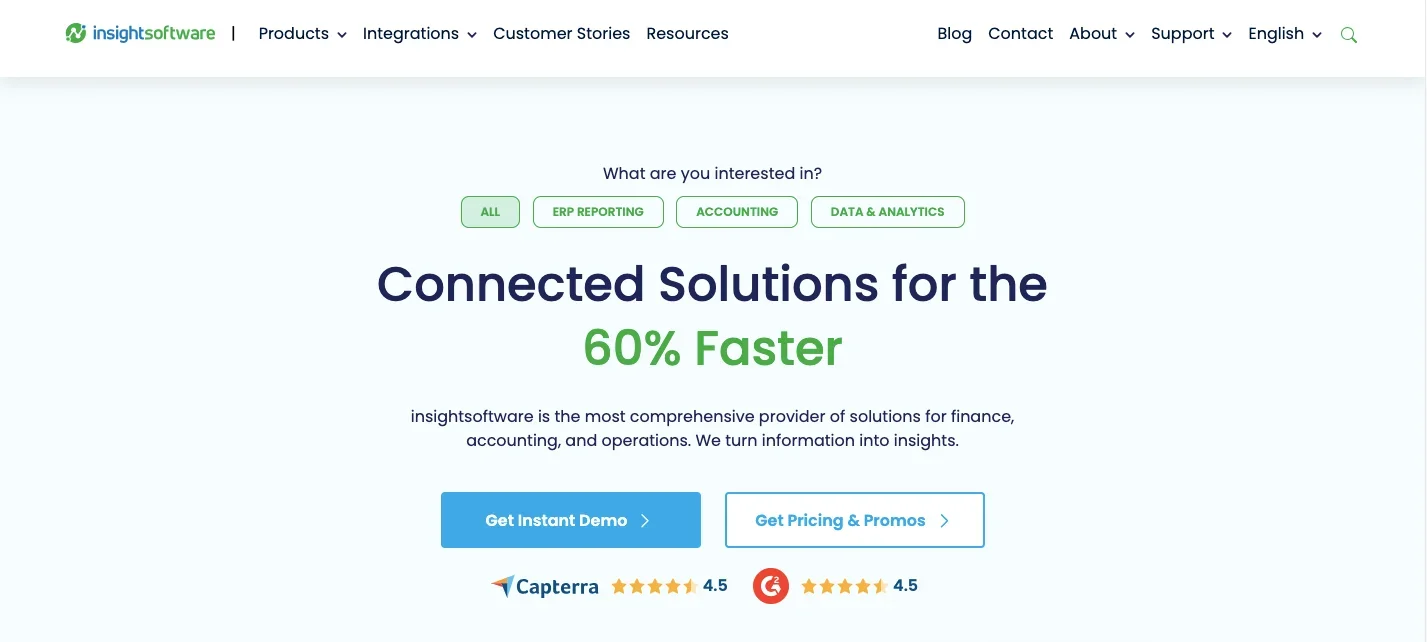
InsightSoftware offers analytics solutions for various industries, including real estate and property management. Their comprehensive suite of solutions also touches on the key aspects of running a business. These include:
- Tax & Compliance
- Financial Reporting
- Budgeting & Planning
- Close & Consolidation
- Accounting & Treasury
- Automation & Data Management
- Operational Reporting & Analysis
These solutions offer valuable solutions for everyday processes and workflow within the real estate industry. Applying them makes it easier for real estate businesses to save time, increase efficiency and reduce errors. The robust financial solutions also enable companies and professionals to improve accuracy and make better decisions. The user-friendly design and interface also make it easier for real estate professionals to navigate the financial aspect of their business while creating a more profitable environment.
Insight Software integrates seamlessly with existing accounting systems, making it easier for professionals to gain clarity by understanding equity in accounting, while also providing enhanced budgeting, forecasting, cash flow analysis, and financial reporting capabilities. With their expertise, real estate professionals can gain deep insights into their financial performance and optimize their strategies accordingly.
3. Buildium - Comprehensive Cloud-Based Property Management
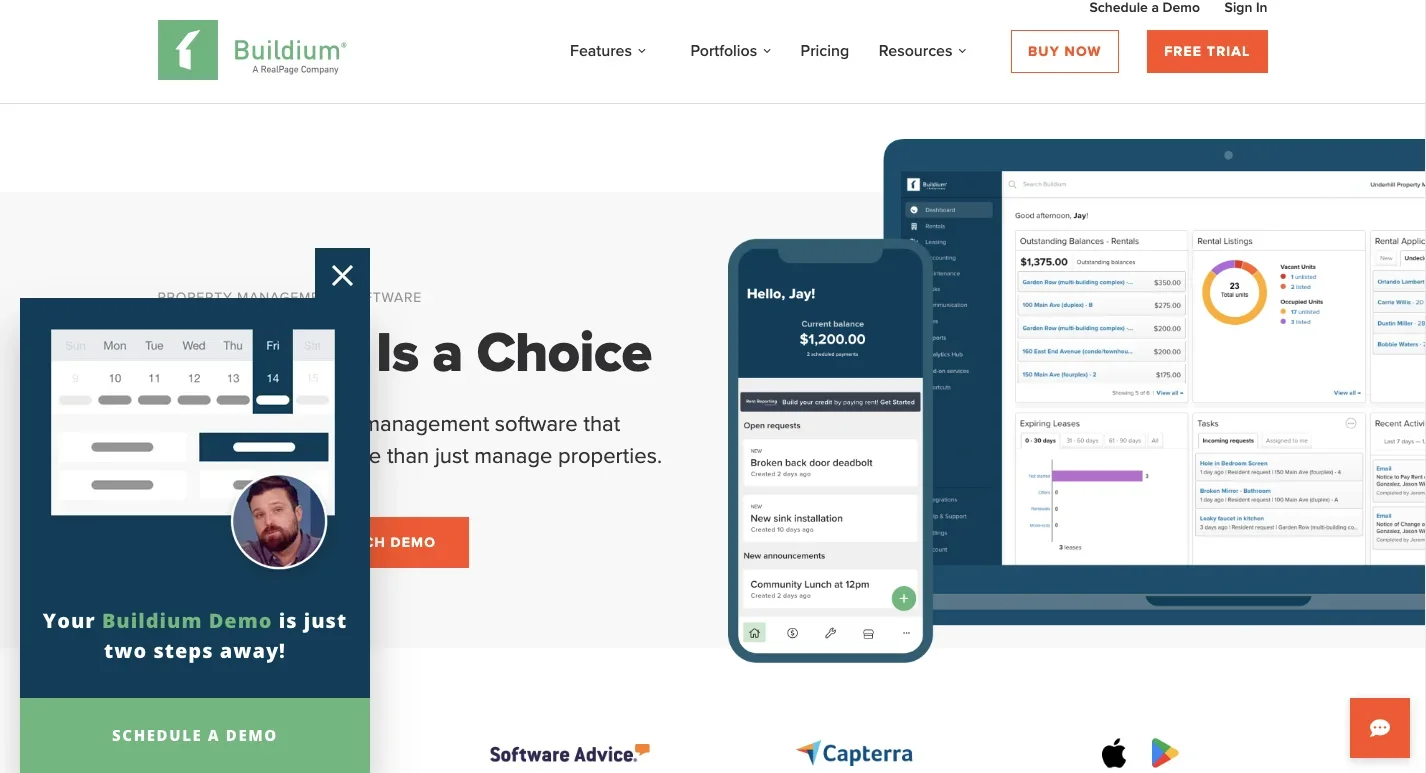
Buildium is an all-in-one property management software with a cloud-based platform purpose-built for property managers and real estate professionals. Key features include rental listings, tenant screening, lease management, rent collection, property accounting, maintenance requests, and communication tools.
Buildium offers guided workflows and automations designed specifically for property management, with automated payment processing for residents, owners, and vendors. The platform includes one-touch syndication to market listings across top rental sites and provides comprehensive reporting and analytics to track rental income, expenses, and key metrics.
Buildium is positioned as a comprehensive solution for larger portfolios, encompassing a wide range of features commonly found in property management software with award-winning customer support. The platform serves residential property managers handling everything from single-family homes to multi-family rentals.
Multiple Listing Service (MLS) Search and Listing Software
Real estate industry professionals and businesses utilize multiple listing service search and listing software to quickly list their properties for clients to view. MLS and listing service real estate tools are the backbones of the industry, providing a centralized platform for real estate agents and brokers to showcase their listings.
Here are a few MLS search and listing options to explore:
4. Crexi - Fast-Growing Real Estate Marketplace
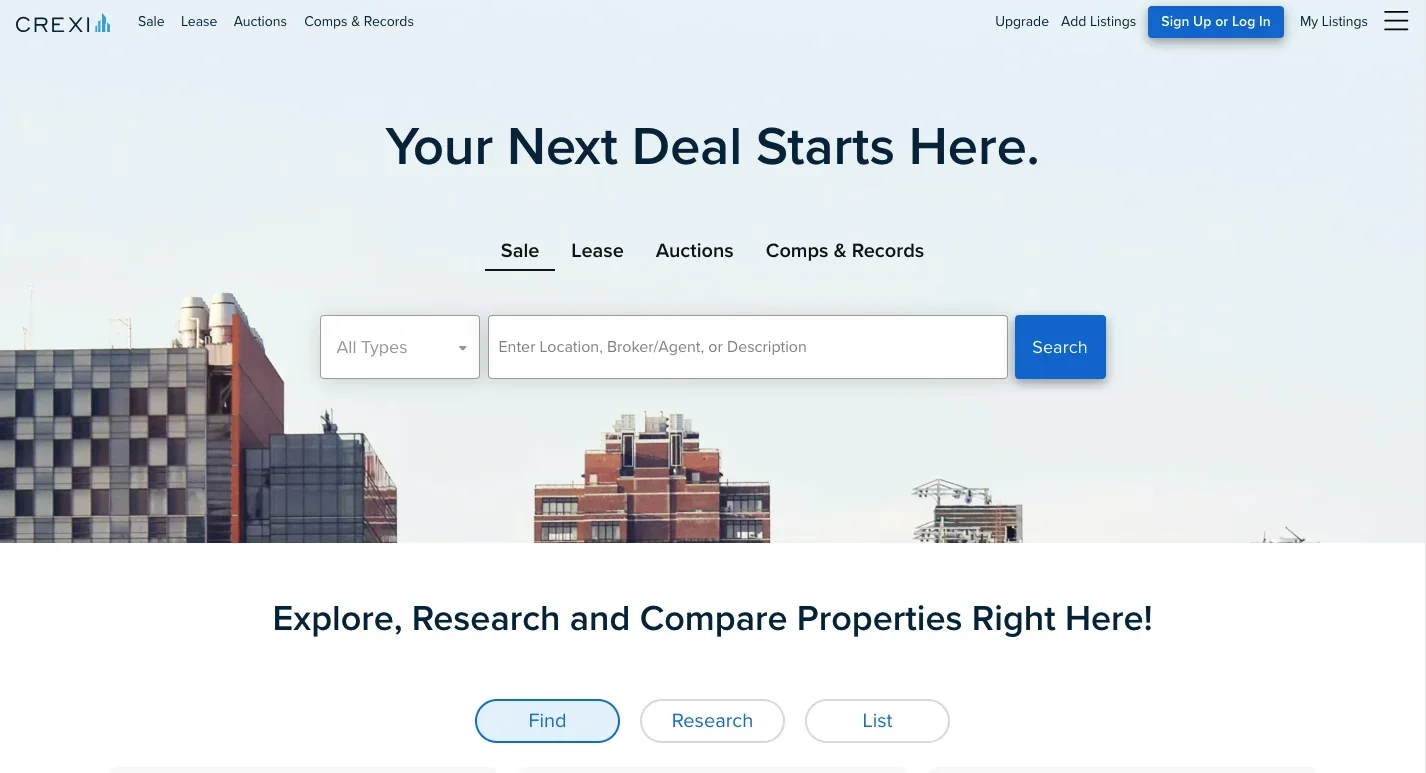
Crexi focuses on providing users with a fast-growing commercial real estate marketplace, allowing brokers and investors to access the latest listings, research property information, and collaborate with one another. Through its powerful analytics tools, Crexi enables users to analyze market conditions in real time and quickly track changes in pricing or occupancy rates.
The platform also provides a comprehensive view of asset performance, including cash flow modeling, investment analysis tools, and lease comparisons. The extensive search functionality allows users to access a wide range of commercial real estate listings across multiple asset classes and locations.
These listings include detailed property information such as photos, floor plans, financials, and leasing terms. With that, prospective buyers and tenants have all the necessary information to make an informed decision. At the same time, agents can evaluate opportunities to buy, sell, or lease properties.
Part of what makes Crexi one of the more popular real estate software solutions is that the platform facilitates seamless collaboration among all parties involved in a real estate transaction, including brokers, buyers, sellers, landlords, and tenants.
Users can securely share documents, track deal progress, negotiate offers, and manage escrow processes, all within the Crexi platform. All these offerings make the platform a huge benefit for commercial real estate brokers, investors, landlords, and tenants seeking an efficient and comprehensive MLS search and listing platform.
5. DispoBlast – Advanced Property Marketing Engine
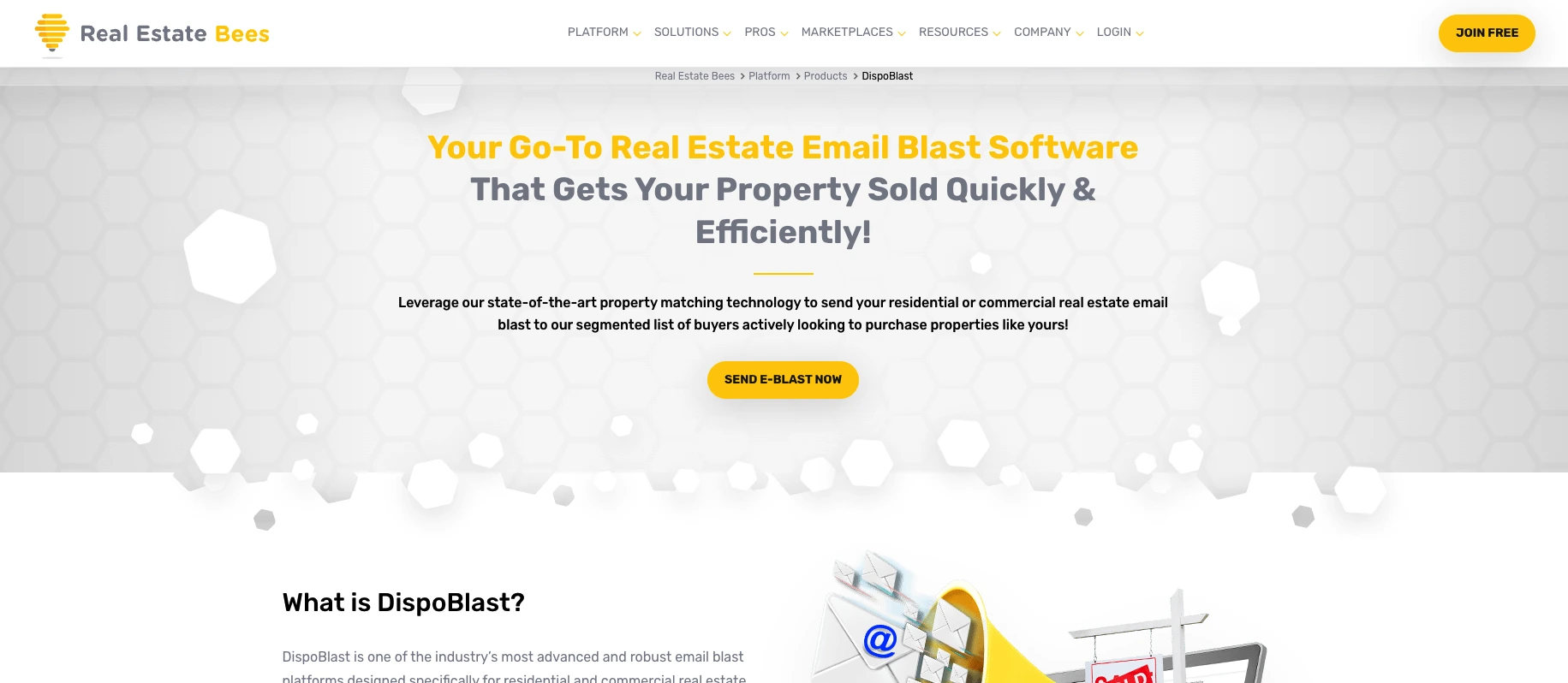
DispoBlast is industry’s most advanced email blast software developed by the Real Estate Bees' engineers and designed specifically for residential and commercial real estate professionals looking for fast and efficient disposition of their real property.
The platform's proprietary property matching technology allows realtors and investors to easily blast their listing to Real Estate Bees' segmented list of buyers actively looking to purchase properties that match that very listing's specifications.
This real estate email blast tool's unparalleled audience targeting and segmentation precision ability ensures that emails are delivered to the most suitable buyers at optimal times, which greatly enhances property marketing effectiveness.
By combining innovation, reach, and precision, Real Estate Bees’ DispoBlast software helps real estate businesses market their properties more effectively while unlocking new growth opportunities in this fast-paced world.
Lead Generation & Nurturing Software
Lead generation and nurturing software are crucial tools in an industry as fast-paced and competitive as real estate. The most popular real estate software solutions for this should include robust solutions and features that will help agents and brokers capture, nurture and manage leads.
Lead generation software helps identify potential buyers and tenants by collecting data from various sources such as websites, social media, third-party listings, local ads, etc. It then uses this data to create comprehensive profiles for each lead, which can be used for segmentation and targeted campaigns.
Let's take a look at the best options for real estate businesses and professionals when it comes to lead generation and nurturing software:
6. Follow Up Boss - Real Estate Lead Management Platform
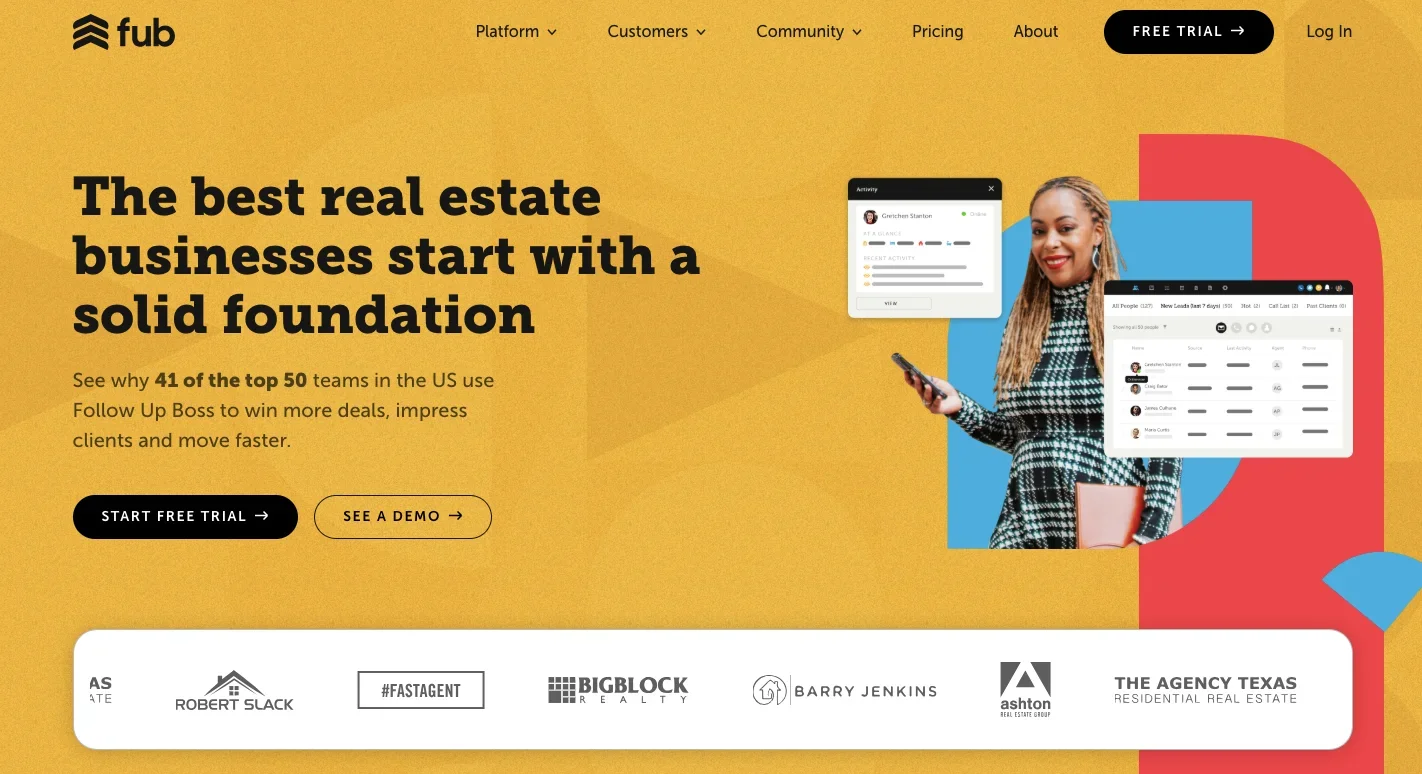
Follow Up Boss is a powerful and intuitive CRM designed specifically for real estate agents, teams, and brokerages, known for its simplicity, automation, and lead management capabilities. Follow Up Boss strikes the perfect balance between useful features and affordability, providing over 250 integrations with popular real estate software.
The platform serves as your central hub, allowing you to effortlessly manage existing software and easily add new tools as your business grows, like an operating system for your real estate business. All plans include access to an extensive library of email and text templates created by the Follow Up Boss community, as well as sophisticated automations called Action Plans.
Follow Up Boss offers excellent organization, marketing, outreach, and lead-nurturing tools, perfect for real estate teams, small brokerages, and individual agents. Action Plans enable you to create custom campaigns that combine emails and scheduled tasks to deliver the right message to the right lead at the right time.
7. RealGeeks - Modern Approaches To Lead Capturing and Management
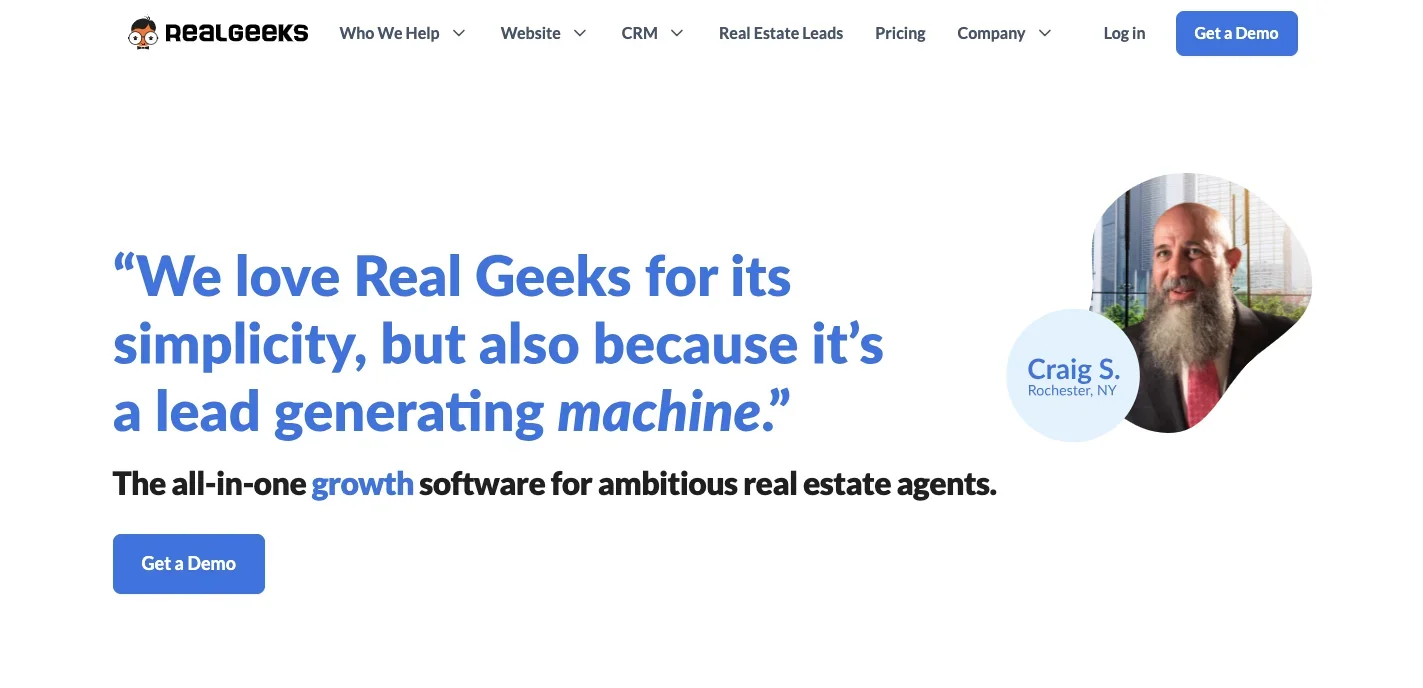
RealGeeks is a powerful platform for real estate professionals looking to grow, nurture, and retain leads using one system. Aside from their comprehensive CRM solutions, they also provide website solutions to ensure businesses and agents have the best online presence possible.
RealGeeks' CRM platform offers a range of features such as lead capture, contact management, lead nurturing, automation, real-time analytics and reporting, and much more. Moreover, they also offer marketing solutions to help businesses and agents build relationships with their clients through engaging content.
Part of what makes them such a popular real estate software solution is their ability to leverage modern AI technology to streamline lead generation and engagement. Adding together their top-notch CRM approach and ability to guide clients in creating an effective lead-capturing website, RealGeeks is the perfect choice for real estate agents and businesses looking for a powerful platform to grow their business.
8. HouseCanary - AI-Powered Property Valuation and Analytics
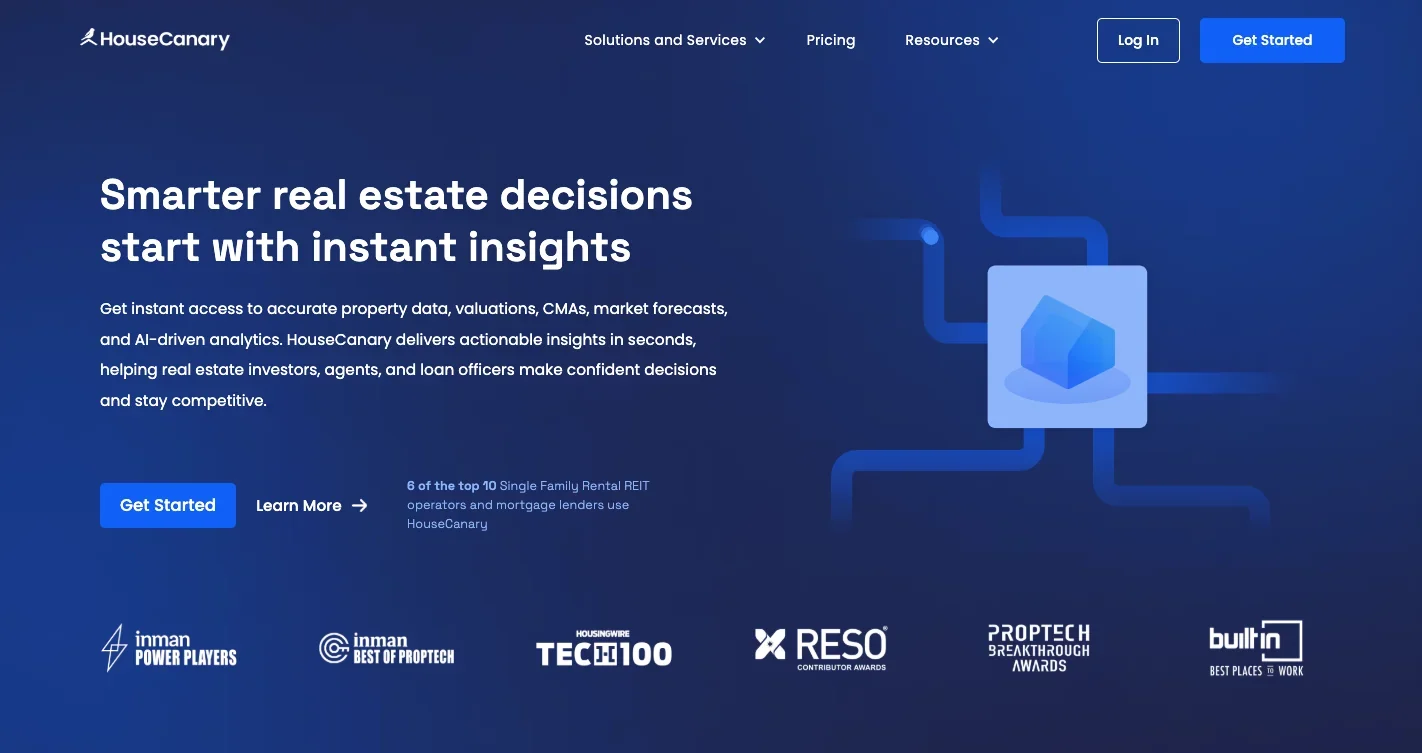
HouseCanary is the industry-leading platform for AI-powered single-family real estate data and analytics, providing accurate insights on over 136 million properties. The platform delivers instant access to accurate property data, valuations, CMAs, market forecasts, and AI-driven analytics.
HouseCanary's AI algorithms analyze vast arrays of real estate data to generate meaningful insights, helping teams be more efficient while saving time and money. The platform provides comprehensive reports including current property value, projected value, value range, confidence score, comparable sales, market trends, and risk factors.
The biggest mortgage lenders, top Single Family Rental REIT operators, and private lenders trust HouseCanary's industry-leading property valuation products and expansive market data. Unlike other real estate software tools, HouseCanary offers a 100% money-back guarantee if users are not satisfied with reports or if reports are not delivered within 24 hours.
Real Estate Marketing & Transaction Management Software
Real estate marketing software is designed to help real estate professionals reach their target audiences, generate leads, and close deals faster. This type of software offers a range of features such as lead capture, automated emails, analytics tools, and more to help users achieve their business objectives.
Incorporating powerful marketing software enables you to engage and connect with potential buyers and tenants more efficiently. Through that, you'll see faster turnaround times on deal closing and a potential for increased ROI overall.
Equally important is transaction management software, which handles the complex process from contract to closing. These platforms automate document workflows, ensure compliance, manage deadlines, and coordinate all parties involved in real estate transactions. Transaction management tools reduce administrative burden, minimize errors, and keep deals moving smoothly through every stage.
Together, marketing and transaction management software create a complete pipeline - from initial lead capture through successful closing. Let's look into today's most popular real estate marketing and transaction management software:
9. Iconosquare - Connect Social Profiles Into One Dashboard
Iconosquare makes it easier to manage and optimize how you use social media platforms by providing a dashboard that consolidates all of your social profiles into one. A consolidated dashboard helps ensure consistency in branding and messaging and provides better insights into how your campaigns perform across different platforms.
Iconosquare offers a range of solutions for real estate professionals, such as content planning, analytics, influencer management, team collaboration tools, and more. They also provide an in-depth look into the performance of your campaigns, with visuals that can help you better understand how to optimize them for maximum results.
To top it off, Iconosquare offers detailed social media analytics and reporting tools that can help you understand the impact of each post or campaign on your target audience. This way, you'll be able to identify patterns and insights to help you make better decisions regarding your real estate marketing strategy. All these features, combined with their user-friendly interface, make Iconosquare the perfect choice for a comprehensive social media management solution.
10. Movavi - Simple Content Editor For Busy Professionals
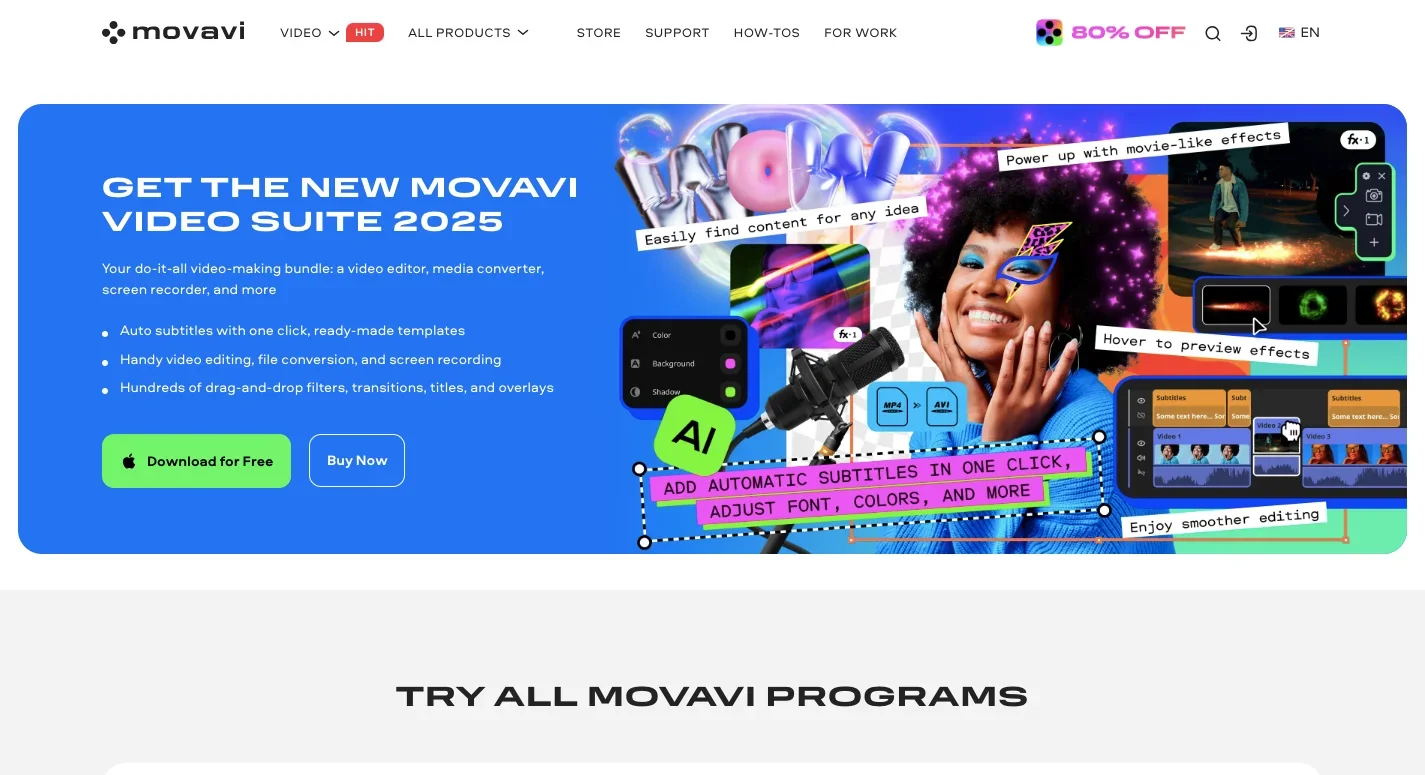
Movavi offers up content editing solutions specifically tailored to real estate professionals. The platform assists you in creating and managing engaging, high-quality content that will help you attract more buyers and tenants.
Movavi's video editing software is simple enough for busy professionals who need more time or skills to create professional-looking videos. Their user-friendly tools make creating engaging content such as property videos, walkthroughs, and aerial shots more accessible.
Their platform also offers a range of tools to help you make the most out of your content. Whether retouching real estate photos, adding music, or creating GIFs for social media, Movavi's got you covered.
11. Matterport - Create Stunning Digital Twins
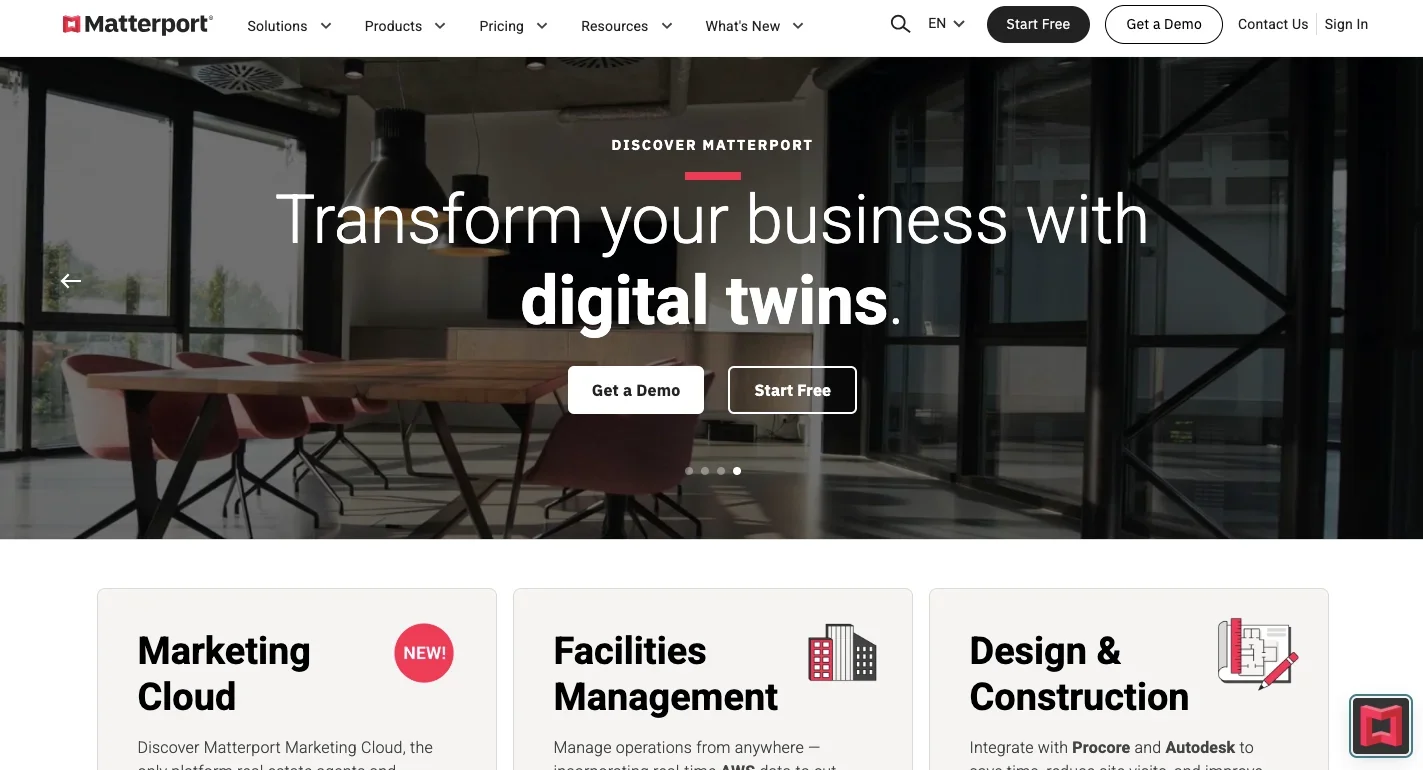
Matterport dives into the PropTech augmented and virtual reality trend with its unique product. It's the only platform that allows you to create digital twins, realistic 3D models of properties that can be explored in virtual reality or through interactive websites.
Creating a digital twin is as simple as taking pictures with Matterport's camera and uploading them onto their cloud platform for easy editing. From there, you can create fully immersive 3D models of your properties with accurate measurements and stunning visuals. These models can be experienced through VR headsets, or you can simply share them on your website for potential buyers to explore.
Matterport's platform allows real estate professionals to provide life-like experiences to their clients without them having to physically visit the property. It's an innovative technology that can help you stand out from the competition and attract more buyers.
12. Vera Reality - Combine Marketing With a Stunning MLS and Listing
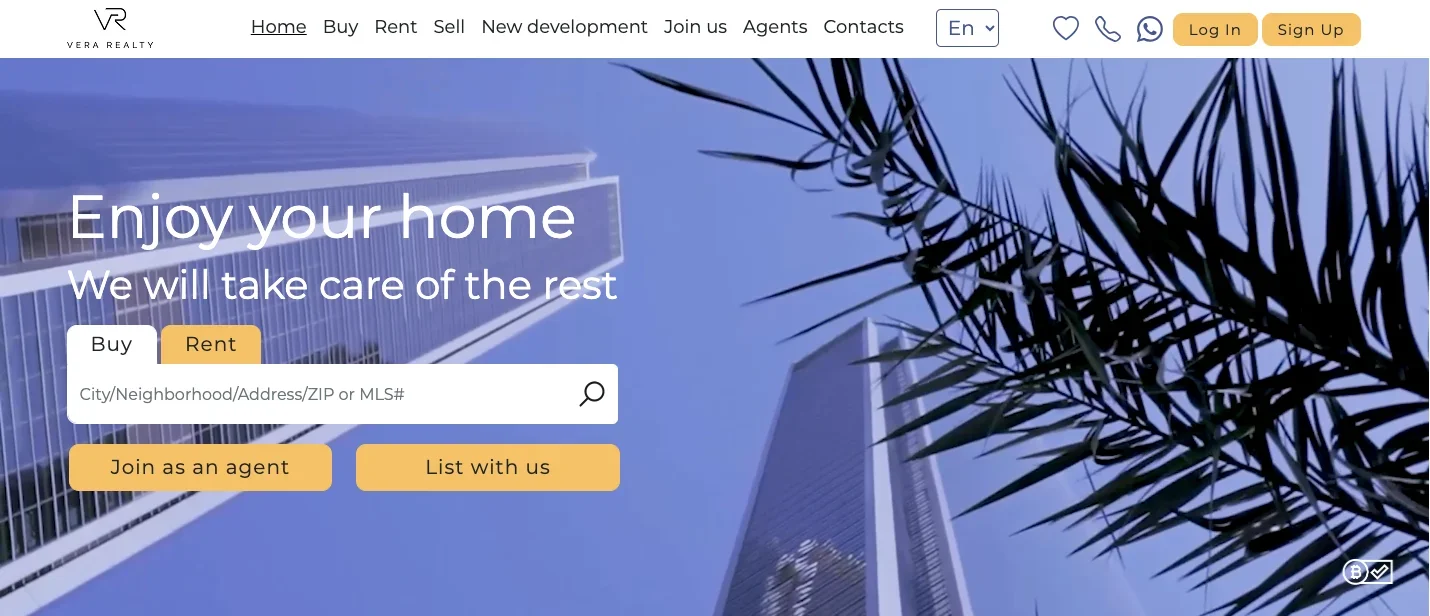
Vera Reality is a platform that uses 3D visualization to help real estate professionals market their properties more effectively. They offer up a modern MLS powered by stunning 3D visuals of homes, powerful listing tools, and analytics features.
Vera Reality's proprietary 3D imaging technology produces high-quality visuals that capture your listings' exact look and feel. With that, agents can attract more leads and interest in their properties. The platform also provides tools for creating high-quality virtual tours that can be experienced through multiple devices.
Their platform allows you to join as an agent or independent lister and begin listing properties for sale or rent and generate leads using automated marketing campaigns. They also offer powerful analytics tools that provide insights into user behaviors and trends in the local real estate market. Vera Reality is an excellent platform for agents looking to stand out in their local market.
13. SkySlope - Real Estate Transaction Management Software
SkySlope is an industry leader in real estate transaction management, serving over 900,000 real estate professionals across the U.S. and Canada and managing over three million transactions annually. The platform combines best-in-class technology with award-winning customer service to provide self-driving transactions and peace-of-mind compliance.
SkySlope offers customizable checklists, streamlined auditing, and intelligent brokerage analytics to ensure compliance throughout the transaction process. Pre-loaded forms make preparing MLS and association forms easier by automatically filling in data and offering quick data entry options. The platform includes DigiSign for effortless document setup and e-signature capabilities.
The software provides commission disbursement and back-office accounting tailored specifically for real estate brokerages. SkySlope's comprehensive feature set includes document storage, audit trails, task management, and automated workflows that help agents and brokerages handle transactions efficiently while staying compliant with industry regulations.
How To Incorporate Real Estate Software Solutions Into Your Process?
It’s one thing to know what real estate software solutions are available in the market today. Still, it is another thing to actually incorporate tech in real estate into your business process. The only way you can leverage the benefits these tools have to offer is to understand where in your process they fit in, and how they can help streamline or improve it.
To get started, follow these five steps toward incorporating real estate software solutions into your process:
Step 1: Identify Your Goals
Identifying your goals means knowing what you want to achieve and mapping out the processes needed to reach those goals. This evaluation will help you outline where software can help streamline or improve existing processes or introduce new ones.
During this step, uncover where specific real estate software solutions can help improve or speed up processes in your process. Doing so will lay the groundwork for picking the right solutions that fit your business needs. Since there are multiple real estate software solutions, understanding which part of your business requires support enables you to make the most out of your chosen solution.
You don't want to end up integrating marketing software where your needs lie in a comprehensive CRM. Ideally, you'll choose a solution that touches every aspect of your process. However, if you wish to focus on one key factor, ensure the chosen software fits the bill.
Step 2: Research Your Options
Now that you've identified the goals and processes for which real estate software solutions can help, it's time to start researching. There are hundreds of options, so take your time looking into each solution's features.
This step is essential because it will give you an idea of what exact capabilities you need to look for when selecting a solution. Compare the features of different software solutions and their pricing and customer support. Each software solution in the same category has unique features to explore.
Some may have a solution more suited to your needs than others. With that, use this step to specify how and why you need such software in the first place. From there, you can set that against a solution's offerings and see what fits.
Step 3: Develop or Start Integrating Your Software Solution
Based on your research in step 2, this step is about developing or integrating the chosen real estate software solution into your process. Depending on how you've identified and prioritized your goals, start by introducing the main solutions before moving on to more detailed tools.
Note that each tool may have its own set of instructions and tutorials, which will help you set it up. Once you understand how it works, you can start to incorporate it into your existing process and align it with the overall goals of your business.
If you're using a comprehensive software platform, like a CRM or transaction management system, take the time to familiarize yourself with each module's capabilities. This is important in helping you understand which processes the software handles and which you will still need to manage manually.
In developing custom real estate software, hiring a professional consultant can prove advantageous during the development and integration phases. Ideally, you'll work with experienced software development teams that can manage the process from start to finish while providing guidance and advice along the way.
Step 4: Monitor The Software Solution's Performance
Successful real estate businesses require efficient technology integration. One such solution is real estate software which helps streamline transactions, templates, and workflow automation. To ensure the system's effectiveness, tracking performance is essential.
Tracking metrics can help you adjust the software solution's parameters to better suit your business's needs. Metrics include lead generation, analytics, follow-up, and contact in software. Real estate professionals can benefit from social media and marketing campaigns through the software's CRM capabilities.
Step 5: Refine and Adjust Based On Need
Refining and adjusting a real estate software solution involves gathering feedback from team members and clients, which can help identify areas for improvement. It's essential to refine your use of the software to ensure it's fully integrated into your workflow.
Evaluating the ROI of the software regularly compared to other available options in the market will also help you optimize its potential. Keeping up with new features and updates to the software can give you an advantage over competitors.
The Future of Real Estate Software Solutions
The real estate industry is experiencing its biggest transformation in decades. What was once a relationship-heavy, paper-driven business is now being revolutionized by sophisticated technology that's creating competitive advantages for early adopters.
Here are the key trends reshaping real estate software in 2025:
AI-Powered Automation Takes Center Stage
Artificial intelligence is moving beyond basic automation to transform core real estate functions. AI tools for real estate lead generation use sophisticated algorithms to sift through vast amounts of consumer data, identify potential leads and even predict which prospects are most likely to become active buyers or sellers.
Smart property valuation systems now deliver estimates with just a 3% error margin, significantly improving accuracy, while AI-powered chatbots handle tenant inquiries, schedule maintenance, and process payments automatically. This isn't replacing human expertise—it's amplifying it by handling routine tasks so professionals can focus on high-value activities.
Predictive Analytics Become Standard Practice
Predictive analytics has emerged as a cornerstone of AI applications in real estate. Using vast datasets, AI systems analyze market trends, economic indicators, and even social media sentiments to forecast market shifts. Real estate professionals are using these insights to identify the best times to buy or sell, optimize investments, and reduce risks.
PropTech Integration Accelerates
The global PropTech market was valued at approximately USD 27.3 billion in 2023 and is projected to reach around USD 119.9 billion by 2032, growing at a compound annual growth rate (CAGR) of over 15%. This growth is driven by platforms that seamlessly integrate multiple functions—from lead capture through transaction management to post-sale analytics.
Sustainability and Smart Building Technology
In the real estate sector, proptech—particularly tools powered by artificial intelligence—will play a major role in reducing residential and commercial building emissions. Considering that approximately 40% of global carbon dioxide emissions come from the real estate sector, the future of proptech will include solutions promoting greater transparency in ESG practices.
Smart building systems now use IoT sensors and AI to optimize energy usage, predict maintenance needs, and automatically adjust lighting and temperature based on occupancy patterns.
The Competitive Reality
Real estate professionals who master these technologies are creating lasting advantages. Studies reveal that businesses leveraging AI in real estate witnessed a 7.3% increase in productivity, a 6.9% boost in customer interaction, and a 5.6% enhancement in operational effectiveness.
The message is clear: the future belongs to real estate professionals who embrace technology as a strategic advantage, not just an operational necessity.
Key Takeaway
The real estate software landscape is moving fast. The solutions in this guide represent what's actually working for real estate professionals today. Some are plug-and-play tools that can improve your operations immediately. Others require more investment but can create lasting competitive advantages. The key is matching the solution to your specific business needs and growth stage, using technology to do what you do best, but faster and more profitably.
The real estate professionals who master this balance will own the next decade. But when off-the-shelf solutions can't keep up with your ambitions, custom development becomes the differentiator.
Ready to build your competitive advantage? Connect with our team at Aloa to explore how custom-built technology can transform your real estate business and set you apart from the competition.
Frequently Asked Questions
1. What security and data privacy measures are in place for real estate software?
Real estate software uses strong encryption for all data.
- Multi-factor authentication protects user accounts.
- Role-based access ensures only the right people see sensitive data.
- Regular audits check for vulnerabilities.
- Providers comply with privacy laws like GDPR and CCPA.
- Secure cloud hosting keeps your data safe.
- Continuous monitoring helps prevent data breaches.
2. How does real estate software support mobile and remote work for teams?
Most real estate software offers mobile apps for iOS and Android. Teams can access data and tools from anywhere, as cloud-based platforms make real-time collaboration easy. Key features include document sharing and messaging. Offline access keeps teams productive without the internet, and updates sync automatically when online again.
3. What kind of onboarding, training, and customer support is available?
Most providers offer live onboarding sessions, video tutorials, and dedicated support teams available via chat, email, or phone. Knowledge bases provide 24/7 self-service resources, with regular updates keeping software current. Support quality varies significantly between providers, so consult each specific provider and compare their onboarding process. It's a crucial factor in choosing the right solution for your team's success.
4. Can real estate software help with compliance and regulatory requirements?
Yes. Real estate software includes compliance checklists and audit trails. Automated reports help meet legal standards. Document management tracks required paperwork. E-signatures ensure secure, legal transactions. This reduces risk and saves time on audits. Providers update their compliance tools as laws change.
5. How do top real estate professionals measure ROI from implementing software?
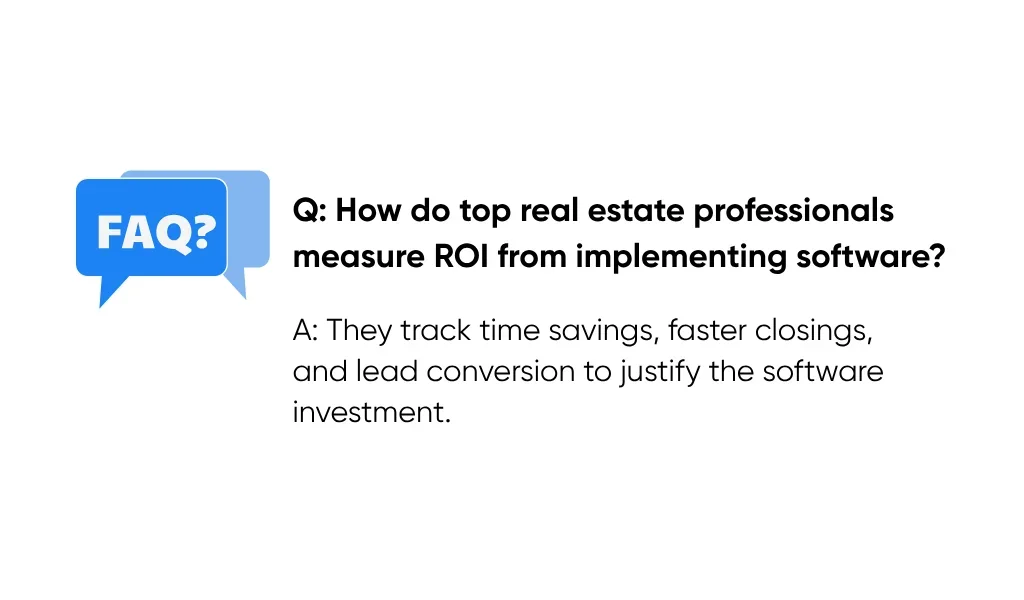
They track time saved on daily tasks. They measure faster deal closings. Improved lead conversion rates are key metrics as revenue growth per agent is monitored. Software dashboards and analytics provide clear performance data that help justify the software investment.
6. What are the most common mistakes to avoid when adopting real estate software?
The biggest mistake is skipping a thorough needs assessment, which leads to choosing the wrong solution, and rushing implementation without testing with a pilot group first. It’s common to overlook training quality, and poor training slows user adoption. Also, avoid making digital transformation decisions without a proof of concept from your provider, as it can be expensive to switch later.

